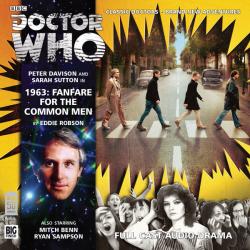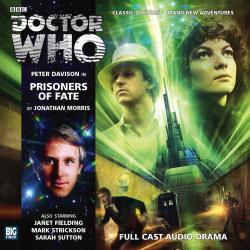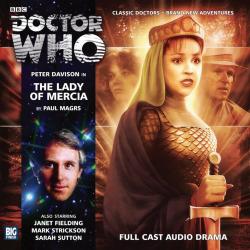
Even though
Tom Baker was in the lead role when I became a teenage Doctor Who fan in 1980,
Peter Davison as the Fifth Doctor was MY Doctor. There was something about his portrayal that I identified with: his youth made him a more accessible ‘hero’ figure than Baker did; his preppy cricketing look influenced my own fashion sense; and his vulnerability was something I could relate to.
Davison visited Melbourne, Australia in 1983 to attend the Logies, Australia’s TV awards. As a giddy 16-year-old, I took the day off school and went into the city where he was doing a promotional book signing appearance in the department store Myer. In front of quite a crowd of excited fans, he tried hard to look enthusiastic as the matronly Myer book department manager, while chatting with him, gushed about the special effects in ‘Time-flight’, which was having a repeat screening on the ABC at the time, and everyone knew she was talking through her hat – even then, ‘Time-flight’ was considered naff. I did feel a little embarrassed that the book he signed for me was the ‘Time-flight’ paperback, just released, but I was too excited. I was there, on the platform, with THE DOCTOR!
Fast-forward 31 years, and I receive a media release email from the Melbourne Symphony Orchestra publicity department announcing interview opportunities with Davison to promote his role as host of the Doctor Who Symphonic Spectacular's Australian and New Zealand tour. Over the years as a freelance writer, I have interviewed many other Doctor Who stars, including Katy Manning, Elisabeth Sladen, Russell T Davies, David Tennant, Matt Smith and Steven Moffat, but this was different. You can imagine my excitement at the prospect of a one-on-one interview with my teenage hero. So I emailed the publicist, explained my position, and was kindly granted an interview with Peter Davison. And here it is.
Tim Hunter: It has been 30 years since your time as the Doctor on TV, but you’ve never really left the role, what with conventions, anniversary specials, audio plays, and now hosting this Symphonic Spectacular. Did you think, back in 1981, that’d you’d still be involved today?
Peter Davison: No. Well, because I really didn’t think that far into the future; you’d realise how old you’d be. I realised when I left it and Colin (Baker) and Sylvester (McCoy) took over that I was still carrying making appearances as the Doctor, so it was obvious it was going to carry on at least as long as the show did. And I suppose when the show went off the air, I thought it would fade discreetly away, but it didn’t do that, and it’s kept me quite busy. So here we are, the longest-running job in show business.
TH: Do you enjoy it?
PD: I don’t mind it at all now. The good thing about when I left, I managed to move on very quickly to other things, like A Very Peculiar Practice, which meant I was then free to continue my association with Doctor Who; it wasn’t affecting my career, so I felt very happy about doing various things.
TH: Now with the show’s very successful return to TV, and the 50th anniversary last years, there’s obviously been a lot of exposure to the classic series and the new series, including your Five(ish) Doctors Reboot, which was a lot of fun – there are some people say it was more fun than the actual 50th anniversary special –
PD: Yeah!
TH: The thing I liked about it was that everyone was so keen on having fun with it and taking the mickey out of themselves, from yourself and Colin and Sylvester right up to Russell (T Davies), David (Tennant) and Steven (Moffat), which was great. Have you enjoyed that resurgence of interest? Has there been more phone calls and knocks at the door?
PD: Well, I realised that last year was going to be a year of Doctor Who, what with various conventions – we came here with The Four Doctors thing, and I was also filming The Five(ish) Doctors, if not writing and planning it, then getting everything together. Once everyone had agreed to do it, just the nightmare of trying to find a day when we were all in the same country proved to be quite difficult. But everyone was quite keen on doing it and sorting it out, and it all worked out very well. So last year was everything Doctor Who, although I did do two other series last year as well, which quite annoyed Janet Fielding (who played Tegan opposite Davison). But I did spend a lot of time on Doctor Who – which is fine and which I love doing.
TH: Apart from the difference in special effects and budget, do you think the new version of Doctor Who is essentially the same show as it was when you were in the role?
PD: I do think it is the same show. Obviously things have changed; not only the budget, but the fact that there’s so much more you can do with that budget, such as digital effects. The role of the companion has changed somewhat too; we were struggling to come up with a good companion character during my time. The difference is really is that where we had the occasional Doctor Who or science-fiction fan writing for the series, now you have exclusively Doctor Who fans and science fiction writers. The producer now writes an awful lot of the series; Russell wrote a lot and now Steven writes a lot; Mark Gatiss writes a lot, and they are all people who grew up watching the classic series. They haven’t come to it wanting to change it completely; obviously they have to update it, but they want to keep it the same – you couldn’t have a bigger fan of the classic series than Steven Moffat. He is the world’s biggest geek. So while he’s changed the way things are done and added various things, essentially, as far as he’s concerned, he’s making the same series.
TH: So what is it for you that indefinable quality of Doctor Who that remains the same?
PD: It started during my time; I tried bringing an area of uncertainty in the Doctor’s mind about whether what he was doing was the right thing to do. He certainly did everything with the best of intentions, but sometimes those intentions didn’t work out quite as they should have. I think that’s something that’s been built on in the new series; that area of doubt the Doctor has. Things go wrong, and it’s not all the Doctor coming in and going ‘Right, I’m doing this and this’. He’s operating on the skin of his teeth a lot of the time, and I like that. He has to pull himself out of the soup.
TH: And now you’re hosting this Symphonic Spectacular. How did you become involved in it?
PD: I was asked to take part in the Doctor Who BBC Proms in the summer, I introduced one segment. It was a great occasion, I loved it, because you go out there, and there’s such a vibrant atmosphere, and hopefully we’ll have the same here. And I was asked then if I would be interested in doing it, and I said yes, certainly. I’m very fond of the idea of what we call classical music, which encompasses a whole lot of orchestral music; it’s not strictly classical, but that’s a finer point. When I was growing up, I did music, and went to a lot of concerts, and early on I was aware of the power of a live symphonic orchestra. It’s something we take for granted; we often hear orchestral music as ‘muzak’, and for young people who don’t go to an orchestral concert, it’s a very good way of letting them hear what it’s like to experience it as a wall of sound.
TH: I attended the Symphonic Spectacular here two years ago, and it is a very vibrant atmosphere. We attended the afternoon session, so there were lots of family and kids, and not only were they thrilled with the live Daleks and Cybermen, but to see them enjoying the music, and the euphoria and emotion the music elicits from you. I was there with my partner and two other friends, and during one of the themes, we were all moved to tears.
PH: Yes, it’s powerful stuff!
TH: And now the orchestrated score is an integral part of the show now; it can be haunting, it can be stirring, it can be frightening, and it can be very moving. How do you respond to it?
PD: Music, in one form or another, has always been very important in Doctor Who. Early on it was the Radiophonic Workshop, which was similarly iconic, although you are limited with what you can do with that. So it’s wonderful that Murray Gold is writing amazing music for the show. Still I think sometimes the irony of music like this is the fact that when you’re watching the programme, it adds to thing, but you don’t notice it particularly. What I noticed during rehearsals yesterday that you’re watching the clip, and you have the orchestra just below the screen playing the music, it really brings home to you what it does add to the scene.
TH: Actually last time when I saw it, there was a software glitch, and they were going to play the music live during the clip, and for some reason the clip started but the orchestra weren’t able to join in, so it was interesting watching the clip without any music at all – and the funny thing was that everyone in the audience pulled out their sonic screwdrivers and pointed them at the screen – but when the music finally did start with the clip, it was a really inadvertent but good demonstration of what the music adds to a scene and how the music tells the story, and you don’t realise how important it is. So, you’re hosting, Tom Baker’s doing a clip – is Matt Smith doing one too?
PD: I don’t think he is. He’s obviously on the screen, but he’s not doing something to camera, as far as I know.
TH: Well, he’s done with now anyway.
PD: Exactly. He’s old news. Matt who?
TH: So, any thoughts of what to expect from Peter Capaldi as the Twelfth Doctor?
PD: He’s a brilliant actor, and I think he’ll bring a lot, and I’m looking forward to it.
TH: In some ways, he’s in the same boat as you were.
PD: In that he’s different.
TH: Yes, but with All Creatures Great and Small, you were already an established actor, and Capaldi is as well. So like they did with you, and called you Doctor Vet, ha haha, they’re doing that with Capaldi and his role in The Thick of It, and saying he’ll be a loud shouty swearing Doctor.
PD: Hahaha, that’d be interesting. Yes, you’re right, and he’s also a complete contrast to the previous Doctor, as I was. But I don’t think there’ll be a problem. My son was very worried because he’s enjoyed dressing up as Matt Smith, but I’m sure it’ll take but a moment and he’ll be won over.
After the interview, Davison agreed to sign a DVD sleeve (‘Castrovalva’ this time, and he marvelled at the ‘Mild Violence’ classification) and have a photo taken with me. I showed him a photo on my phone of my signed copy of ‘Time-flight’ (he remembered the book signing and the crusty matron), we chatted briefly about Melbourne’s crazy hot summer (he’d arrived on a 40 degree day), how Katy Manning was as mad as a cut snake, and how gracious Elisabeth Sladen had been, and then it was over. Even though it was only 20 minutes, Peter was warm, attentive, articulate and candid – just as I expected him to be. I’m just glad I didn’t gush too much, or melt into a fan-geek mess. So thank you, Melbourne Symphony Orchestra, not only for the Doctor Who Symphonic Spectacular, but for allowing me to meet MY Doctor.
The
Doctor Who Symphonic Spectacular runs in Melbourne from 31st January to 1st February before moving to Brisbane on 8th February and Wellington from 21st February to 22nd February.
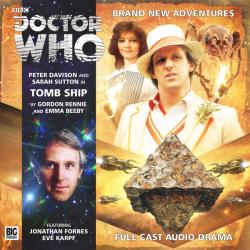
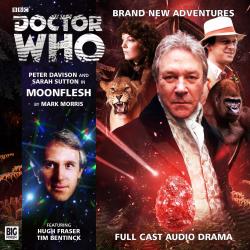
 Even though Tom Baker was in the lead role when I became a teenage Doctor Who fan in 1980, Peter Davison as the Fifth Doctor was MY Doctor. There was something about his portrayal that I identified with: his youth made him a more accessible ‘hero’ figure than Baker did; his preppy cricketing look influenced my own fashion sense; and his vulnerability was something I could relate to.
Even though Tom Baker was in the lead role when I became a teenage Doctor Who fan in 1980, Peter Davison as the Fifth Doctor was MY Doctor. There was something about his portrayal that I identified with: his youth made him a more accessible ‘hero’ figure than Baker did; his preppy cricketing look influenced my own fashion sense; and his vulnerability was something I could relate to. 